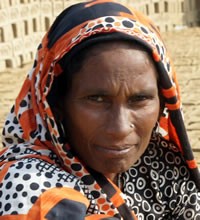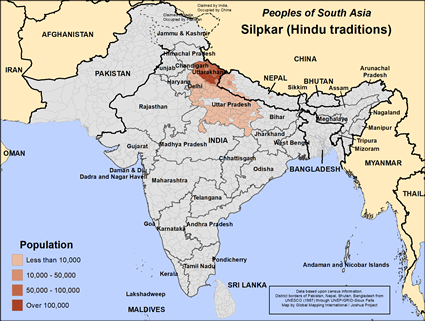Silpkar (Hindu traditions) in India

Photo Source:
Copyrighted © 2026
Isudas All rights reserved. Used with permission |

Map Source:
People Group data: Omid. Map geography: UNESCO / GMI. Map Design: Joshua Project.
|
| People Name: | Silpkar (Hindu traditions) |
| Country: | India |
| 10/40 Window: | Yes |
| Population: | 936,000 |
| World Population: | 999,000 |
| Primary Language: | Garhwali |
| Primary Religion: | Hinduism |
| Christian Adherents: | 0.44 % |
| Evangelicals: | 0.00 % |
| Scripture: | New Testament |
| Ministry Resources: | Yes |
| Jesus Film: | Yes |
| Audio Recordings: | Yes |
| People Cluster: | South Asia Dalit - other |
| Affinity Bloc: | South Asian Peoples |
| Progress Level: |
|
Introduction / History
The Silpkar lived as tribals until they were taken as slaves by the Khasia and later by the immigrant high castes. The name Silpkar is generally used for the communities categorized lowly and residing in the hilly areas of Uttar Pradesh. The Silpkar are also known as Dom, Dum, Ram, Arya and Harijan.
They speak the Kumaoni and Garhwali languages. They also use Hindi while communicating with others but Kumaoni with one another. They are especially populous in Uttaranchal but also in Uttar Pradesh.
What Are Their Lives Like?
Various occupational groups of the Silpkar still pursue their traditional hereditary occupations such as black smithy, copper smithy, basketry, masonry, oil-pressing, drum beating, and leather work, etc. They also engaged in agriculture and animal husbandry, manufacture agricultural implements, making baskets and household utensils, etc. The Silpkar are divided into different hierarchically arranged groups based on their hereditary occupations.
They allow for marriage for those within the same status groups. Adult marriage is the norm. They are arranged through family negotiation. They cremate the dead and then observe a time of death pollution.
What Are Their Beliefs?
Some of their deities are Bhairon, Betal, Kalchhin, Kalua, Chhurmall and Gangnath, etc. They worship these deities as family, village and regional deities.
What Are Their Needs?
The Silpkar people need to put their hope in the King of kings, realizing that he is the one who provides protection, hope and dignity to all who call on his name.
Prayer Points
Pray for the spiritual transformation of this caste-bound community.
Pray for the Lord to bless the Silpkar people economically and spiritually as a testimony of his power and love.
Pray for good educational facilities, rehabilitation and vocational training.
Pray for spiritual hunger and discernment to lead them towards the cross and the empty grave.